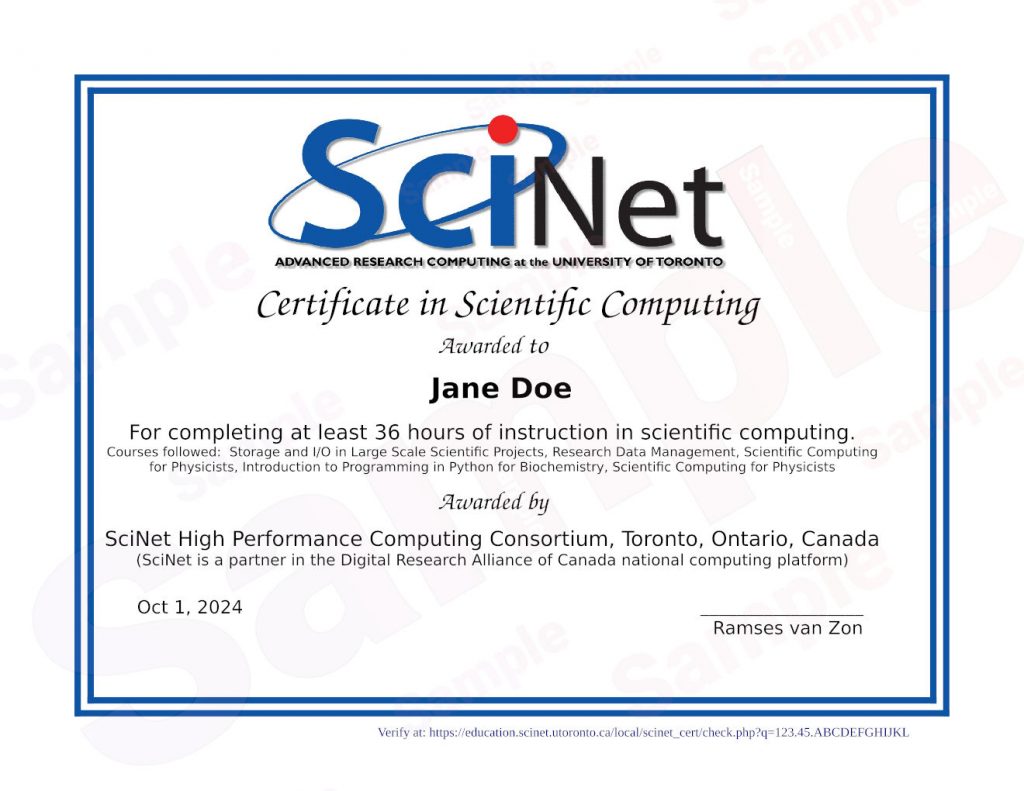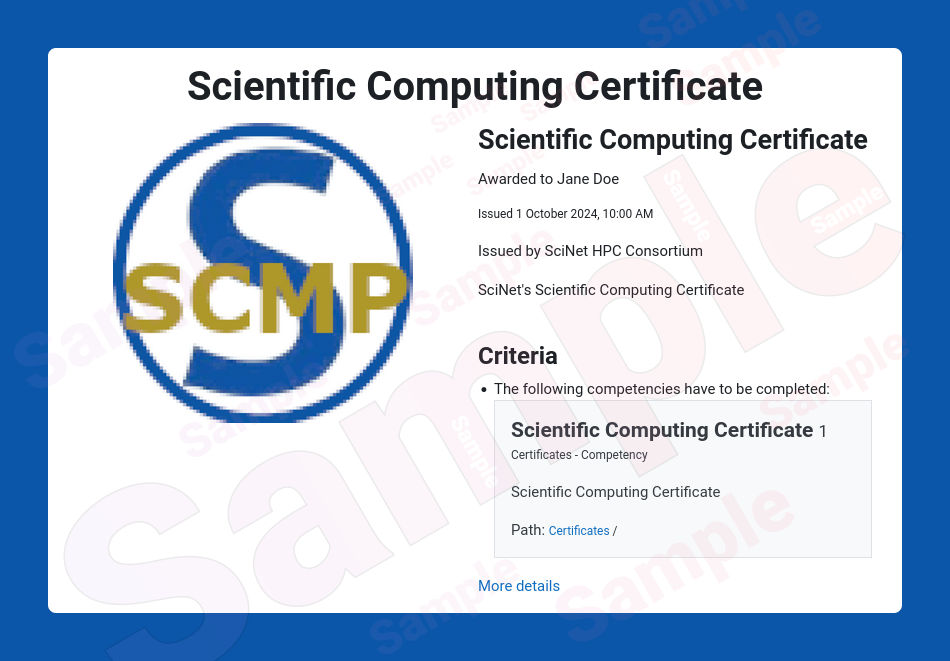

SciNet has been teaching courses on scientific technical computing and high performance computing for the Toronto-area research community since 2009. Starting in 2013, it has offered recognition to attendees of its training program in the form of three SciNet Certificates: A Certificate in Scientific Computing, a Certificate in High Performance Computing, and a Certificate in Data Science. All certificates come with equivalent badges on SciNet’s education website (Moodle).
Requirements for these certificates are based on credit-hours of SciNet courses successfully completed. The number of credit-hours for a course is typically equal to its duration, with additional credits for courses with home work.
Prerequisites
The requirements such as programming skills vary per course; these are specified on each course page on the SciNet Education Website when the courses are announced.
Many courses have a hands-on component that requires participants to have access to their own laptop.
Who can participate in the certificate program?
SciNet courses and certificates are open to all users with an active account on CCDB. In general, any academic researcher from a Canadian research institution with significant computing requirements to support their research can get an account (for more information, see the Getting Started page). Students at the University of Toronto that are not CCDB users (yet), as well as students from other Canadian universities, can get a temporary account for the education site to be able to take the courses.
Do the certificates count as University credits for my graduate degree?
No, the SciNet Certificates are not University credits, and will not appear on transcripts. However, several SciNet courses are offered in partnership with other departments at the University of Toronto for graduate credit.
Can I attend the courses online?
Many SciNet courses are given virtually. Recordings and slides are usually posted on the SciNet education site afterwards, so they could be watched asynchronously even for those courses that have an in-person delivery. However, only SciNet courses with graded homework or tests can be taken for SciNet certificate credits without having been physically or virtually in attendance.
Certificate in Scientific Computing
Scientific computing is now an integral part of the scientific endeavour. It is an interdisciplinary field that combines computer science, software development, physical sciences and numerical mathematics.
This certificate indicates that the holder has successfully completed at least 36 credit-hours worth of coursework in general scientific computing topics such as software development, version control, testing, visualization, and data management.
Requirements
- A total of 36 credit-hours or more from the list of SciNet courses on scientific computing (see below).
- Upon completion of your certificate requirements, you will automatically be issued this certificate and its equivalent badge on SciNet’s education site. To request a hard copy, email support@scinet.utoronto.ca.
Recent Courses that count towards the Scientific Computing Certificate
- Introduction to Linux Shell (3 credits)
- Advanced Linux Command Line (3 credits)
- Advanced Linux Shell Programming (3 credits)
- Introduction to Programming with Python (8 credits)
- Introduction to Apptainer (3 credits)
- Securing File Access Permissions on Linux (2 credits)
- Introduction to Computational Biostatistics with R (8 credits)
- Quantitative Applications for Data Analysis (8 credits)
- Scientific Computing for Physicists (28 credits)
See our Education Site for the current offering.
Certificate in High Performance Computing
High Performance Computing, or supercomputing, is using the largest available computers to tackle big problems that would otherwise be intractable. Such computational power is needed is a wide range of fields, from bioinformatics to astronomy, and big data analytics. Since the largest available computers have a parallel architecture, using and programming high performance computing applications requires a specialized skill level.
This certificate indicates that the holder has successfully completed at least 36 credit-hours of coursework in high performance computing topics, such as programming models like OpenMP, MPI, CUDA, or parallel development tools like debuggers.
Requirements
- A total of 36 credit-hours or more from the list of SciNet courses on high performance computing (see below).
- Upon completion of your certificate requirements, you will automatically be issued this certificate and its equivalent badge on SciNet’s education site. To request a hard copy, email support@scinet.utoronto.ca.
Recent Courses that count towards the High Performance Computing Certificate
- Intro to SciNet/Niagara (self-guided, 1 credit)
- Shared Memory Programming with OpenMP (3 credits)
- Programming Clusters with MPI (4 credits)
- Intro to Supercomputing and SciNet (4 credits)
- Scientific Computing for Physicists (8 credits)
- Parallel Debugging
- Python and HPC (3 credits)
See our Education Site for the current offering.
Certificate in Data Science
To reflect the growing trend in data-driven science, machine learning and artificial intelligence, SciNet also offers a certificate focused on data science. To earn the SciNet Certificate in Data Science, users or students need to take at least 36 credit-hours of data science related SciNet courses.
Requirements
- A total of 36 credit-hours or more from the list of SciNet courses on data science (see below).
- Upon completion of your certificate requirements, you will automatically be issued this certificate and its equivalent badge on SciNet’s education site. To request a hard copy, email support@scinet.utoronto.ca.
Recent Courses that count towards the Data Science Certificate
- Introduction to Computational Biostatistics with R (28 credits)
- Neural Network Programming (16 credits)
- Quantitative Applications for Data Analysis (28 credits)
- Relational Database Basics (3 credit)
- GIT Version Control (3 credits)
See our Education Site for the current offering.
